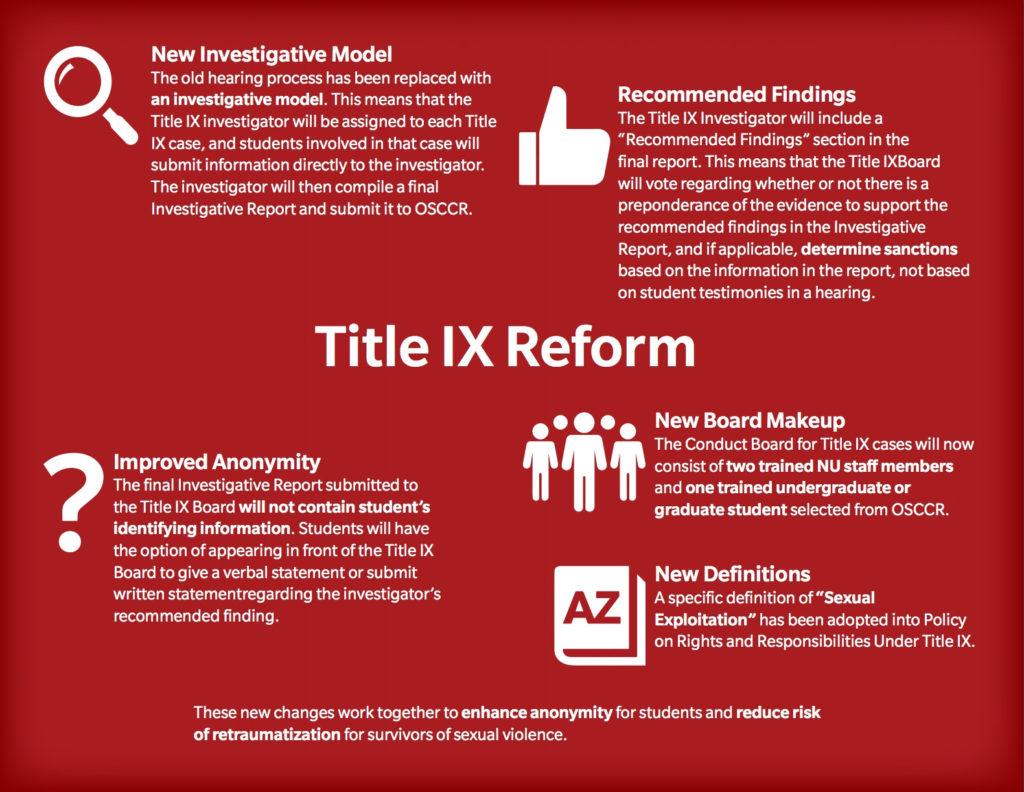Editorial: All forms of discrimination must be addressed
New Title IX procedures are designed to protect survivors and encourage students to report cases of assault and harassment. / Graphic courtesy of the Northeastern Student Government Association
November 12, 2017
Going over Title IX is a mandatory part of the college experience. At Northeastern, Title IX is addressed multiple times at orientation by representatives from the Office for University Equity and Compliance and then again by orientation leaders. Later, when students move into their dorms, resident assistants go over the policy and any procedures having to do with it. Periodically throughout the year reminders will be sent to review Title IX.
These reviews are a mandated for universities. They are required to provide students with the information they need to understand how Title IX affects them and know what resources are available them to them if they ever need to report an incident. The law protects against any sex-based discrimination in education, but it isn’t the only law in place to protect students against bigotry they might face on their campuses.
The U.S. Department of Education’s Office for Civil Rights lists laws that prohibit discrimination based on race, age and disability. Yet it’s Title IX that universities focus all of their transparency efforts and in doing so information about other injustices on campus slip through the cracks.
A recent case at the University of Hartford shows what can happen when racial discrimination happens on a college campus. Former student Brianna Brochu was charged with misdemeanor criminal mischief and breach of peace after she bragged in an Instagram post that she had gotten rid of her roommate by tampering with her belongings. She wrote in the post, “After one and a half months spitting in her coconut oil, putting moldy clam dip in her lotions, rubbing used tampons on her backpack, putting her toothbrush places where the sun doesn’t shine and so much more, I can finally say goodbye to Jamaican Barbie.” Prosecutors are looking to charge her with a hate crime as well.
The black student who faced this discrimination took her story to Facebook in a video when she felt her university was dragging its feet to address her situation. Following Chennel Rowe’s video, there was a social media frenzy that eventually brought her story to major news outlets like The New York Times and The Washington Post. University of Hartford has stated that they put the case through all the appropriate channels and treated the case as they would any discrimination case on their campus. However, it’s an important part of this story that Rowe felt her school’s administration was so unhelpful that she had to take her story to a public platform.
This should serve as a cautionary tale to the university that teaches us the fight against discrimination must be preemptive. The fact that discrimination happens on campuses sadly cannot be disputed. Knowing this, the administration must do everything it can to make sure students know their rights are protected on this campus and that, should they face bigotry of any kind, there are already systems in place to help them address it and get justice.
Title IX may be the poster child for anti-discrimination, but other policies exist as well. There should be more mentions of Title VI, which prohibits discrimination based on race, color or national origin, and of Section 504 of the Rehabilitation Act of 1973.
Even with the emphasis Northeastern places on students knowing about their Title IX rights and any procedures for reporting any violations, cases of sexual assault on campus go mishandled. Discrepancies between campus police data and survey data show that many rapes go unreported at the university. If this can happen even when the university all but paints Title IX as the sole anti-discrimination policy the university has, it’s concerning to think what discrimination isn’t being addressed because students aren’t aware that there are pathways for them to report these violations.
The Office for University Equity and Compliance is responsible for investigating complaints of discrimination. They state on their website that any member of the Northeastern community who believes that they have been discriminated is strongly encouraged to report the incident. Yet the procedures to do so are not explained at orientations, in emails or by RAs.
Northeastern students must know from the moment they join the campus community what they can do about discrimination. The university must begin to send the message that discrimination doesn’t begin and end with sex and gender.







